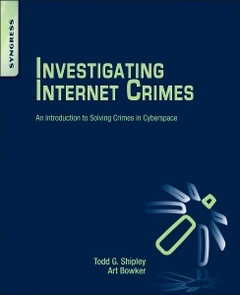Investigating Internet Crimes An Introduction to Solving Crimes in Cyberspace
Auteurs : Shipley Todd G., Bowker Art

Written by experts on the frontlines, Investigating Internet Crimes provides seasoned and new investigators with the background and tools they need to investigate crime occurring in the online world. This invaluable guide provides step-by-step instructions for investigating Internet crimes, including locating, interpreting, understanding, collecting, and documenting online electronic evidence to benefit investigations.
Cybercrime is the fastest growing area of crime as more criminals seek to exploit the speed, convenience and anonymity that the Internet provides to commit a diverse range of criminal activities. Today's online crime includes attacks against computer data and systems, identity theft, distribution of child pornography, penetration of online financial services, using social networks to commit crimes, and the deployment of viruses, botnets, and email scams such as phishing. Symantec's 2012 Norton Cybercrime Report stated that the world spent an estimated $110 billion to combat cybercrime, an average of nearly $200 per victim.
Law enforcement agencies and corporate security officers around the world with the responsibility for enforcing, investigating and prosecuting cybercrime are overwhelmed, not only by the sheer number of crimes being committed but by a lack of adequate training material. This book provides that fundamental knowledge, including how to properly collect and document online evidence, trace IP addresses, and work undercover.
1. Introduction to Internet Crime 2. Internet Criminals 3. How the Internet Works 4. Collecting Legally Defensible Online Evidence 5. Documenting Online Evidence 6. Using Online Investigative Tools 7. Online Digital Officer Safety 8. Tracing IP Addresses Through the Internet 9. Working Unseen on the Internet 10. Covert Operations on the Internet 11. Conducting Reactive and Proactive Internet Investigations 12. Internet Resources for Locating Evidence 13. Investigating Websites and Webpages 14. Investigating Social Networking Sites 15. Investigating Methods of Communication 16. Detection and Prevention of Internet Crimes 17. Putting it all together 18. Conclusion
Digital investigators, law enforcement personnel, private investigators, DoD, intelligence agencies and attorneys
Art Bowker (@Computerpo) has over 28 years experience in law enforcement and corrections. His first book, The Cybercrime Handbook for Community Corrections: Managing Risk in the 21st Century, describes the process of supervising cyber-offenders. Bowker cowrote his second book, Investigating Internet Crimes, 1st Edition: An Introduction to Solving Crimes in Cyberspace, with Todd Shipley. His second book provides step-by-step instructions for investigating Internet crimes, including locating, interpreting, understanding, collecting, and documenting online electronic evidence to benefit investigations. Besides his two books he has written numerous law enforcement and corrections articles published by Perspectives, an American Probation and Parole Association (APPA) publication , Federal Probation, and the FBI Law Enforcement Bulletin. On January 14, 2013, Bowker was awarded the APPA Sam Houston State University Award, for work in promoting awareness and knowledge of cybercrime and tools to combat such crimes in the field of community corrections. On November 22, 2013, he was recognized by the Federal Probation and Pretrial Officers Association (FPPOA) with their top honor, the Richard F. Doyle Award, for having made the most significant achievement in, or contribution to, the Federal Probation & Pretrial Services System or the broader field of corrections. Additionally, Bowker received the Thomas E. Gahl, Line Officer of the Year Award (Great Lakes Region Award), which is named in honor of the only U.S. Probation Officer killed in the line of duty. Both awards centered on his contributions and efforts in managing cybercrime risk.
- Provides step-by-step instructions on how to investigate crimes online
- Covers how new software tools can assist in online investigations
- Discusses how to track down, interpret, and understand online electronic evidence to benefit investigations
- Details guidelines for collecting and documenting online evidence that can be presented in court
Date de parution : 11-2013
Ouvrage de 496 p.
19x23.4 cm



